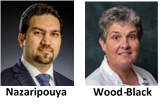
OK NSF EPSCoR Awards Two Seed Grants through the S3OK Project
EPSCoR Update - October 2022
The Oklahoma NSF EPSCoR program through the NSF EPSCoR Research Infrastructure Improvement Track-1 project “Socially Sustainable Solutions for Water, Carbon, and Infrastructure Resilience in Oklahoma (S3OK)” has awarded two seed grants up to $75,000 per award aimed at developing and testing science-based solutions for complex “wicked” problems at the intersection of land use, water availability, and infrastructure in Oklahoma.
The Seed Grant recipients are:
 Drs. Hamidreza Nazaripouya (Oklahoma State University, OSU), and Frankie Wood-Black (Northern Oklahoma College-Tonkawa)
Drs. Hamidreza Nazaripouya (Oklahoma State University, OSU), and Frankie Wood-Black (Northern Oklahoma College-Tonkawa)
AI-Enabled Proactive Resilience Enhancement of Electric Infrastructure Against Wildfire
This project aims to improve grid resilience under wildfires in terms of active robustness, resourcefulness, rapid recovery, and adaptability. Specifically, the project will design and develop a proactive self-healing mechanism for the electrical grid, by considering real-time wildfire impacts, such that a grid can automatically mitigate wildfire adverse impacts and continue its operation. The expected outcome and benefits in this project are: 1) Wildfire Mathematical Impact Models along with Numerical and Probabilistic Wildfire Impact Scenarios, which will provide a powerful tool to analytically analysis the impact of key wildfire byproducts (e.g., flame, smoke, heat, ash, etc.) on electric infrastructure, and develop probabilistic wildfire impact scenarios and contingency models; and 2) Wildfire Self-healing Solutions, which will offer an integrable decision-making-tool for system self-healing and wildfire impact mitigation to ensure the resilient operation of the grid.
________________________
 Drs. Arif Sadri (University of Oklahoma), Kristin Olofsson (OSU), and David Reed (University of Science and Arts of Oklahoma)
Drs. Arif Sadri (University of Oklahoma), Kristin Olofsson (OSU), and David Reed (University of Science and Arts of Oklahoma)
Risk Mapping of Interdependent Social and Physical Infrastructure Networks in Oklahoma (I-SPIN-OK)
The goal of this research is to offer a holistic network diagnostic framework that considers complex interdependencies in coupled social-physical infrastructure systems. This project aims to measure how risk is communicated in online social networks and develop network profiles of risk communication in conjunction with co-located physical networks. In particular, the research team specifically seek to 1) measure how households, agencies and/or stakeholders activate their access to social and physical networks during a major crisis; 2) examine how social networks correlate, both spatially and temporally, with physical networks that govern risk assessments, concerns about basic needs (e.g. food, water, gas, electricity), and protective actions (e.g. access to local roads, emergency supply, shelter); and 3) uncover how co-dependent and co-located social and physical networks transition from warning to response and shape community recovery.
____________
Funding for this project was provided by the National Science Foundation under Grant No. OIA-1946093 through OK NSF EPSCoR.
